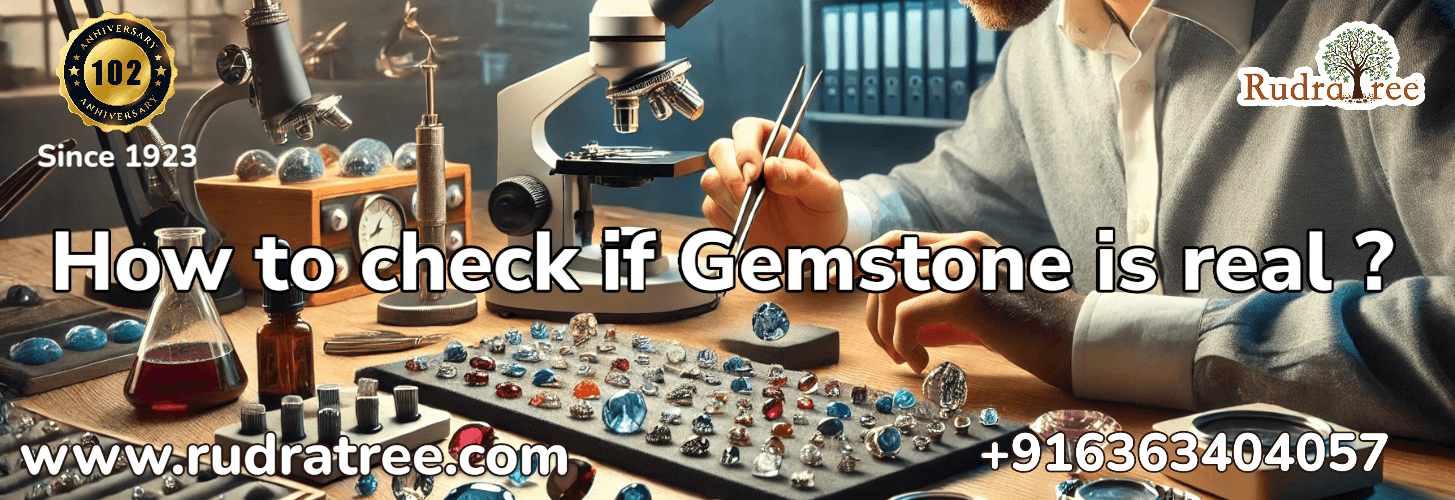How To Check If Gemstone Is Real?
How To Check If Gemstone Is Real?
Blog Article

Understanding Gemstones: How to Identify Authentic Gemstones and Avoid Fake Ones
Gemstones are rare, precious, and beautiful, often coming at a very high price. They are used for both astrological and jewelry purposes. However, due to a lack of awareness, some buyers may end up purchasing synthetic (fake) or treated (not 100% pure) gemstones. Unfortunately, many un-informed astrologers and pundits perpetuate myths like “always buy 100% clean and clear gemstones,” failing to realize that most natural gemstones have inclusions as their birthmarks. Clear, transparent, and flawless gemstones are extremely rare, making them prohibitively expensive for most people. This scarcity drives certain dealers to sell fake or treated gemstones, taking advantage of the high demand and limited supply.
Is There Any DIY Test to Identify If a Gemstone is Real?
Unfortunately, there is no reliable DIY test to accurately determine whether a gemstone is real or fake. While the internet is full of articles claiming to offer helpful tests, many of these suggestions are misleading, such as “soaking the gemstone overnight in milk” to check for authenticity. These tests are often myths designed to misguide customers.
Some tests, like evaluating the gemstone’s density, may have a basis in fact. For instance, a Sapphire should be nearly four times as heavy as water. While this method could work, it requires significant practice and expertise. Without proper lab instruments, it is challenging to determine a gemstone’s true weight and authenticity. Therefore, to accurately verify a gemstone’s authenticity, a sophisticated laboratory setup is essential.
What Should You Check While Buying a Gemstone?
The Scientific Name of the Gemstone
Gemstones are sometimes sold under local trade names, which can cause confusion. For example, “Sunela” is often used to refer to both Topaz and Citrine, even though they are two different gemstones with different properties and prices. To avoid confusion, always refer to the gemstone by its scientific name rather than its local trade name.
Is the Gemstone Natural or Synthetic?
Most natural gemstones have synthetic counterparts. While synthetic gemstones share the same physical, optical, and chemical properties as their natural counterparts, they are man-made in a lab under controlled conditions. Creating a synthetic gemstone takes only hours, whereas natural gemstones form over millions of years. However, synthetic stones lack the natural energy and magical powers of their natural counterparts.
Is the Gemstone Treated?
Many gemstones are treated to enhance their color, clarity, texture, and optical effects. Unfortunately, this information is often concealed from customers to sell treated stones at higher prices. Always inquire about whether a gemstone has been treated to ensure you’re making an informed purchase.
Where to Buy a Genuine Gemstone?
When purchasing a gemstone, always ask for a laboratory report from a reputed gemological laboratory. The report should confirm the authenticity of the gemstone and indicate any treatments (if applicable). It is also highly recommended to consult with a qualified original gemstone gemologist before making a purchase. A gemologist is a professional who can identify gemstones and distinguish between natural and synthetic stones.
Why Choose Rudratree?
Rudratree, with over 102 years of expertise in gemstones, is dedicated to offering only genuine, lab-certified natural and untreated gemstones. Our experts meticulously test each gemstone to ensure authenticity before it reaches our customers. We provide complete transparency by sharing all essential details about each gemstone to ensure you make an informed purchase.
Contact Us:
For more information or to purchase a gemstone, visit our website at www.rudratree.com or call us at +91 63634 04957.